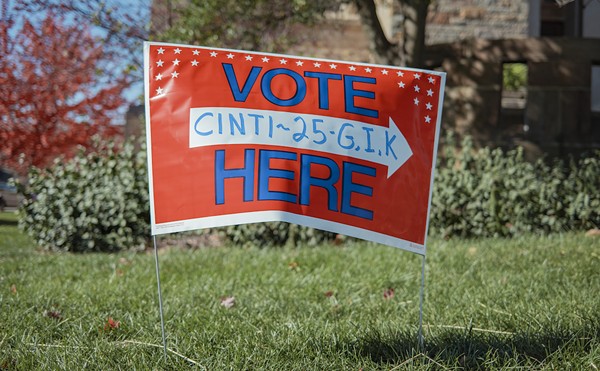|
You can't put a price on fairness. Or maybe you can. A bell rings as you walk through the door of Ten Thousand villages, Cincinnati's first fair-trade retail store. To the left is a shelf filled with indigenous Nativity scenes — one from Peru contained within a small blue pot placed on its side. To the right is a menorah, situated next to a hand-carved wooden dreidel.
As you make your way to the counter, you pass coffee samples, handmade paper and beaded necklaces in fiery reds and blues that rival the sky.
Ten Thousand Villages, which celebrated its grand opening Nov. 21, brings to the market not only new products, but also a new attitude. The O'Bryonville shop is a non-profit retail store, dedicated to alleviating poverty in Third World nations.
But don't mistake this for a charity. Fair trade is serious business.
'Non-profit' doesn't mean unprofitable
Ten Thousand Villages is associated with Transfair USA, which defines fair trade as an "innovative concept that connects producers and consumers in more equitable, more meaningful and more sustainable ways."
The 180 Ten Thousand Villages stores across the United States and Canada sell handmade crafts, native instruments, homemade paper and Fair Trade coffee, dealing only with cooperatives in Latin America, Asia and Africa that pay fair wages and provide safe working environments.
"We are very different from how another corporation would work," says Sayrah Namaste, assistant manager at Ten Thousand Villages. "Most corporations would give you a letter or certificate and then, when they get the goods in, (the workers) get paid. We don't do it that way. We pay 50 percent when we make the order. Then before the goods are shipped, we pay the rest of it, so all the money is given upfront."
Advance payment helps artisans remain debt free and provide for their families and villages. As a member of the Fair Trade Federation, the corporate offices of Ten Thousand Villages have to meet strict membership criteria to qualify as a fair-trade organization.
"It's pretty complicated to figure out what is a fair wage in Indonesia vs. what is a fair wage in Guatemala," Namaste days. "So what they do is that they look at the length of time it takes for a product to be made and how many workers did it take to make it, but mostly the artisans and the cooperatives set the price. That way we know that it's fair."
But how exactly does a non-profit retail store remain afloat, and how much money is actually returned to the Third World artisans?
The 2001 annual report by Ten Thousand Villages says 44 percent of the corporate profit goes to store operations. The only operating costs at the O'Bryonville store are the salaries of the manger and assistant manager, rent and utilities. All other staff members are volunteers. Craft purchase constitutes 26 percent of the total company expenses. But as more stores open, more orders can be made, supporting more villages.
"Just because you are a non-profit doesn't mean that you don't make a profit," says board chair Karen Diller. "So what our hope is, and what happens in a successful store, is that you are able to meet all of your expenses and then some, and then the board will have their choice. Do we want to make our store larger if it is successful, or do we want to send it back to Ten Thousand Villages to the corporate headquarters and let them use that money to help some other city start another Ten Thousand Villages store?"
'Not just a liberal thing'
The opening of the O'Bryonville store has been a dream 13 years in the making. It started as a small sale during Christmas in the basement of the Cincinnati Mennonite Fellowship.
The sales' success inspired the people who are now the members of the board to open the store. Ten Thousand Villages headquarters asked the board to raise half the money; and one year and $52,000 later, they signed the lease.
"It's very exciting, for sure," Diller says. "I think I've been too busy to sort of be able to take it all in. Most of us are still pinching ourselves."
Ten Thousand Villages is a program of the Mennonite Central Committee (MCC), started in 1946 in the basement of an MCC worker who sold embroidery, needlework and woodwork from artisans in Puerto Rico, Palestine and Haiti. MCC is a department of the North American Mennonite and Brethren in Christ Churches, which focus on service, relief and development.
Although connected with a Christian church, Ten Thousand Villages aims to empower people from all walks of life.
"We want this to be a very ecumenical project," Diller says. "I think helping other people is not just a Mennonite thing, its not just a Christian thing, its not just a liberal political thing, it's much more encompassing than that."
"We work with people of all faiths, and we respect their faith and honor it as well as their culture," Namaste says.
A third of the people who enter the store have never heard of Ten Thousand Villages, according to Ann Nofziger, a member of the board.
"One of the most exciting things is to hear people's reactions when they come into the store," she says. "I've yet to hear anything negative. It's all been very positive, and that makes me feel good."
The names and life stories of the artisans appear above displays of their work, so the store has an educational purpose as well as an economic one.
"To me, (the most meaningful thing) is looking at the suffering we see in this world today and knowing that there is something we can do," Namaste says. "Even something as simple as our buying power can (bring) change." ©





